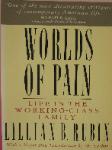“The affluent and happy worker of whom we have heard so much in recent decades doesn’t exist,” declares Lillian Rubin in this brilliant and moving account of the angers, frustrations, and small joys of life in the American white working class today. She describes the grim
childhood memories of the men and women who make up what has been called “the silent majority,” their troubled marriages, uncommunicative sex lives, unfulfilling work, and all too costly leisure. In doing so, she uncovers frightening ambiguities in the lives of people to whom America promised so much, but delivered so little.
Middle-class aspirations have placed an almost intolerable burden on these working-class families, many of whom manage to get by on less than $10,000 a year, but then slip ever more deeply into debt to purchase cars, washing machines, colored television sets, and other prized symbols of social mobility. And though the women’s movement and the sexual revolution have indeed reached the working class, the result has not been “liberation” but an intense strain on marriages which, however much the individuals may try, remain traditional because of the social, psychological, and economic realities in which their lives are embedded.
The author’s observations, based on well over a thousand hours of in-depth personal interviews with wives and husbands of fifty working-class families and a comparison group of twenty-five professional middle-class families, make Worlds of Pain, the most valuable insight into the dynamics of working-class family life available today.
Lillian Rubin, herself the child of a working-class family, writes with the luminous clarity of a fine novelist in poignantly describing the reality of a life that, “despite all modern conveniences,” still “costs worlds of pain.”
